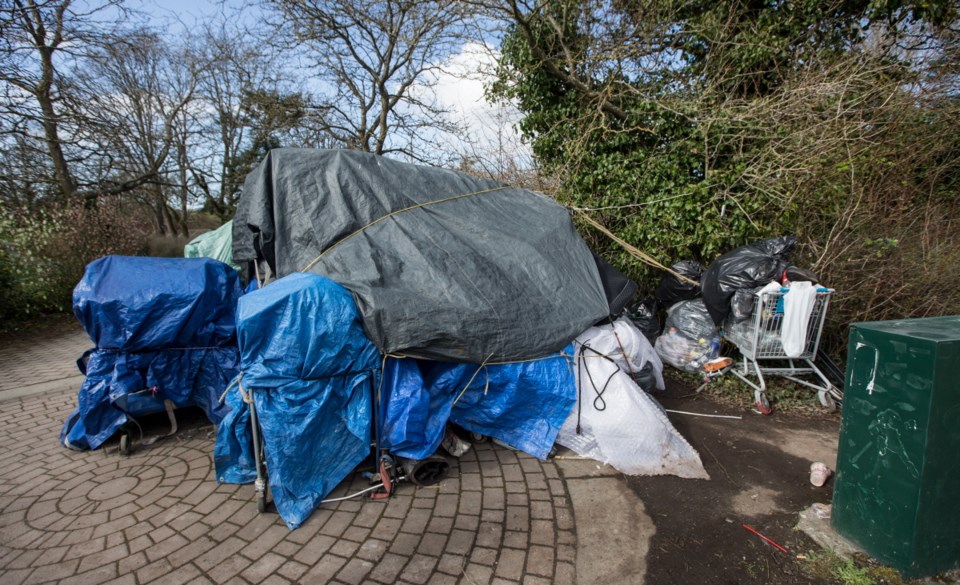In Greater Victoria, we apparently have no interest, desire or thought regarding evidence-based solutions to homelessness. This was made clear in the recent court decision to evict the residents of Camp Namegans and kick them to the curb without the requirement that housing be provided. B.C. Supreme Court Justice Ward Branch took a distinctly different position than Justice Christopher Hinkson, who required that housing be provided before residents of Super InTent City were displaced from the courthouse lawn.
In the absence of affordable and culturally appropriate housing and supports, residents of Camp Namegans found community and safety in a Saanich park. As one resident stated: It will be five times harder to pull themselves up without this camp. While we might reject tent cities, they are a form of self-help initiated by people with direct experience of homelessness in the absence of other options.
Since the 1980s, when homelessness emerged as a significant social concern, service providers, researchers and homeless people themselves have sought solutions that will address the health and safety issues associated with homelessness. Among the multitude of solutions tried and tested, Housing First has emerged as a clear winner.
Housing First means that people are immediately housed without conditions or expectations of housing readiness. In one of the largest studies in the world, the At Home/Chez Soi project followed 1,000 people and found that 80 per cent of them were still housed after one year.
People in Housing First programs use less health services, spend less time in the legal system and have improved community integration and quality of life. Like anyone, people experiencing homelessness are better able to find stability, better health and quality of life if they receive housing first.
Housing First is official federal government policy. Communities across the country have implemented Housing First, and some communities such as Medicine Hat, Alta., have dramatically reduced or ended homelessness. The Greater Victoria Coalition to End Homelessness has endorsed a Housing First approach for almost a decade.
Our community has sought to increase the supply of housing to make Housing First a reality in our community. Although there are promises of housing, these are not yet a reality. In the absence of an affordable housing supply, solutions such as rental supplements and modular housing can be implemented immediately.
Clearly, the courts and Justice Branch are completely unaware of the evidence regarding Housing First and the fact that promises are not realities. While they might be aware that displacing homeless people from Camp Namegans will increase health and social harms and exacerbate the risks of homelessness, it is inconvenient to do anything to address those harms.
People who are homeless are subject to many health and safety risks, including violence, assault, depression, social isolation, suicide, overdoses, infectious diseases, dehydration and exposure. With few resources, tent cities, in the absence of affordable and acceptable housing, help to mitigate these harms.
Instead, the courts focused almost exclusively on harms of fire safety and stigmatizing perceptions of criminality, ignoring the evidence and adding to criminalization through law enforcement of the order to leave. This recent court decision flies in the face of evidence, cost-effectiveness and accepted public policy, and, worst of all, lacks compassion.
We will be held accountable for the failure to implement evidence-based solutions to homelessness and we will be called to apologize for failing to act on the evidence. In the meantime, know that the evidence is clear: People experiencing homelessness are subject to poorer health and often die prematurely compared to the general population.
Instead of mitigating these harms and fast-tracking evidence-based solutions, this decision increases risks and harms. As you sit in your home with access to water, flush toilets and a fridge to store food, try this thought experiment as you go to sleep in your warm and dry bed: If you did not have these things and had been excluded from these resources because of systemic failures and gaps, where would you prefer to be? Alone in an alley, huddled behind a building, solo camping, sleeping with 40 people you don’t know on a mat on a floor, or with a community of people who shared and understood some of the experiences you have had?
Bernie Pauly is a professor in the School of Nursing and a scientist at the Canadian Institute for Substance Use Research at the University of Victoria.



